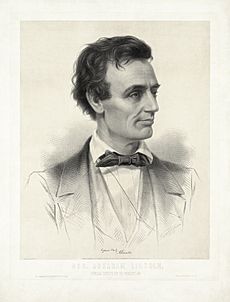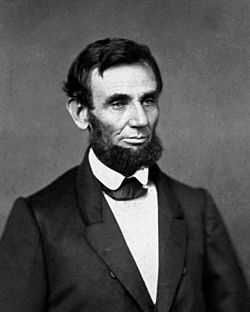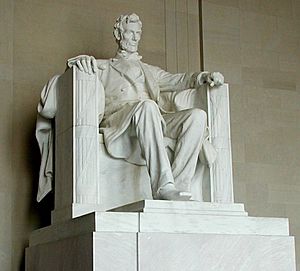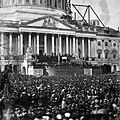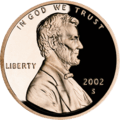Abraham Lincoln facts for kids
Quick facts for kids
Abraham Lincoln
|
|
|---|---|
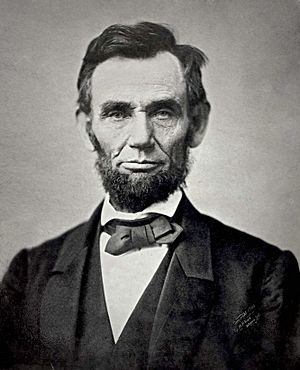
Lincoln in November 1863
|
|
| 16th President of the United States | |
| In office March 4, 1861 – April 15, 1865 |
|
| Vice President | Hannibal Hamlin (1861 to 1865); Andrew Johnson (March — April 1865) |
| Preceded by | James Buchanan |
| Succeeded by | Andrew Johnson |
| Member of the U.S. House of Representatives from Illinois's 7th district |
|
| In office March 4, 1847 – March 4, 1849 |
|
| Preceded by | John Henry |
| Succeeded by | Thomas Harris |
| Personal details | |
| Born | February 12, 1809 Hodgenville, Kentucky, U.S. |
| Died | April 15, 1865 (aged 56) Washington, D.C. |
| Nationality | American |
| Political party | Republican and Whig |
| Height | 6 ft 4 in (1.93 m) |
| Spouse | |
| Children | |
| Parents |
|
| Signature | |
Abraham Lincoln (February 12, 1809 – April 15, 1865) was an American politician. He was the 16th President of the United States. He served as president from 1861 to 1865, during the American Civil War. Just five days after the war was ending, John Wilkes Booth ended Lincoln's life. Lincoln was the first U.S. president to be assassinated. He is remembered as the "Great Emancipator" because he worked to end slavery in the United States.
Contents
- Lincoln's Early Life and Family
- How Lincoln Became "Honest Abe"
- Lincoln's Start in Politics
- Lincoln Becomes President
- Lincoln's Children
- Lincoln's Lasting Impact
- Famous Quotes from Abraham Lincoln
- Interesting Facts About Abraham Lincoln
- Questions Kids Ask About Abraham Lincoln
- Images for kids
- See also
Lincoln's Early Life and Family
Abraham Lincoln was born on February 12, 1809, in Hodgenville, Kentucky, United States. His parents were Thomas Lincoln and Nancy Hanks Lincoln. His family was poor. Abraham had one brother and one sister. His brother died when he was a child. Lincoln grew up in a small, one-room log cabin. Even though slavery was legal in Kentucky, Lincoln's father, who was a religious Baptist, chose not to own any slaves.
When Lincoln was seven years old, his family moved to Indiana. Later, they moved to Illinois. As a child, he helped his father work on the family farm.
On October 5, 1818, when Abraham was nine, his mother died. His 11-year-old sister Sarah then took care of the household. His father later married again.
When he was 21, he worked on a flatboat that carried goods. At 22, he left home and moved to New Salem, Illinois. There, he worked in a general store and as a postmaster. He later said he went to school for only one year. But that was enough to learn how to read, write, and do simple math. In 1842, he married Mary Todd. They had four children, but three of them died very young.
In 1851, Abraham's father died at the age of 73.
How Lincoln Became "Honest Abe"
Abraham Lincoln was sometimes called Abe Lincoln or "Honest Abe." This nickname came from a time when he ran miles to give a customer the correct change. The name "Honest Abe" also came from when a business he started failed. Instead of running away from his problems, he stayed and worked hard to pay off his debt.
Lincoln's Start in Politics
Lincoln started his political journey in 1832. He ran for the Illinois General Assembly, but he lost the election. He served as a captain in the Illinois militia during the Black Hawk War. This was a conflict with some Native American tribes. When he moved to Springfield in 1837, he became a lawyer. Soon, he was one of the most respected lawyers in Illinois. He traveled to different courts for many years.
In 1846, Lincoln joined the Whig Party. He was elected to serve one term in the House of Representatives. After that, he focused on his law career. In 1854, Lincoln became involved in politics again. This was because of the Kansas–Nebraska Act. He joined the Republican Party, which was new and against the spread of slavery. In 1858, he ran for senator against Stephen A. Douglas. He lost the race, but their debates made him famous across the country. The Republican Party then chose him to run for President in 1860.
Lincoln Becomes President
Lincoln was chosen to run for president in 1860 for several reasons. His views on slavery were less extreme than other candidates. He was from a Western state, which gave him a better chance to win votes there. Other experienced candidates had enemies within the party. Lincoln's poor family background also fit the Republican idea of free labor, which was the opposite of slave labor. Lincoln won the election in 1860 and became the 16th President of the United States. He won with almost no votes from the Southern states. This was the first time a president had won mainly because of strong support from the North. During his presidency, Lincoln was known for his tall stovepipe hat. He used it to carry papers and documents when he traveled.
The Civil War Begins
After Lincoln's election in 1860, seven states left the Union. These states were South Carolina, Mississippi, Alabama, Florida, Georgia, Texas, and Louisiana. They formed the Confederate States of America. When the United States refused to give up Fort Sumter in Charleston, South Carolina, the Confederate Army attacked the fort. This attack started the American Civil War. Later, four more states (Arkansas, Virginia, Tennessee, and North Carolina) joined the Confederacy. This made a total of eleven Confederate states. As President, Lincoln had to use military force to bring the Union back together. He also had to stop "border states" like Kentucky, Missouri, and Maryland from joining the Confederacy.
The Emancipation Proclamation
With the Emancipation Proclamation, Lincoln ordered freedom for all slaves in the states that were still fighting against the Union during the Civil War. This order did not immediately free all slaves. This was because those areas were still controlled by the rebelling states of the Confederacy. Only a small number of slaves already behind Union lines were freed right away. As the Union army advanced, nearly all four million slaves were eventually freed. Some former slaves joined the Union army after 1862.
The Proclamation made freeing slaves a main goal for the Union in the war. It also stopped European nations, especially Great Britain and France, from recognizing the Confederacy as a separate country. Lincoln then supported a change to the Constitution to free all slaves. The Thirteenth Amendment, which made slavery illegal everywhere in the United States, was passed in late 1865. This was eight months after Lincoln was assassinated.
The Gettysburg Address
During the important Battle of Gettysburg, many soldiers from both sides died. Abraham Lincoln gave a very famous speech called the Gettysburg Address. He gave it at the new cemetery for the soldiers who had died there. It is one of the most famous speeches in American history.
Second Term and Assassination
Lincoln was re-elected president in 1864 by a small number of votes. He started his second term on March 4, 1865. Soon after, it became clear that the Union would win the Civil War. Lincoln suggested peace terms that would not be too harsh on the states that had rebelled. He wanted them to be able to govern themselves again. On April 9, 1865, the main Confederate general, Robert E. Lee, surrendered his armies. On April 11, 1865, Lincoln gave a speech where he supported voting rights for black American citizens.
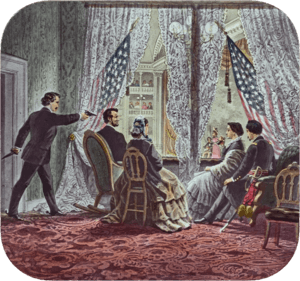
On April 14, 1865, Lincoln signed the law that created the Secret Service. This is the U.S. President's security force. That evening, Lincoln went to a play with his wife, Mary Todd, at Ford's Theater in Washington, D.C.. He had invited Ulysses S. Grant to join them. As a general, Grant would have brought extra military security. However, Grant did not attend the play.
During the play, John Wilkes Booth, a well-known actor and a Confederate spy, entered the presidential box. He shot Lincoln at close range and shouted, "Sic semper tyrannis" ("Thus always to tyrants"). An unconscious Lincoln was carried across the street to Petersen House. He was placed on the bed at an angle because he was so tall. He remained in a coma for nine hours before he died the next morning. Lincoln was the first American president to be assassinated.
Booth escaped but died from shots fired during his capture on April 26.
Lincoln's Children
President Lincoln and his wife Mary Todd Lincoln had four sons:
Only Robert lived to be an adult. Of Robert's children, only Jessie Lincoln had children (two: Mary Lincoln Beckwith and Robert Lincoln Beckwith). Neither Robert Beckwith nor Mary Beckwith had any children. So, Abraham Lincoln's direct family line ended when Robert Beckwith, Lincoln's great-grandson, died in 1985.
Lincoln's Lasting Impact
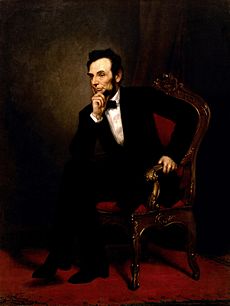
Lincoln has always been seen by experts and the public as one of the greatest U.S. Presidents. He is often considered the greatest leader for his actions during the American Civil War. People also remember his powerful speeches, like the Gettysburg Address.
Famous Quotes from Abraham Lincoln
- “Whatever you are, be a good one.”
- “My concern is not whether God is on our side; my greatest concern is to be on God's side, for God is always right.”
- “America will never be destroyed from the outside. If we falter and lose our freedoms, it will be because we destroyed ourselves.”
- “Folks are usually about as happy as they make their minds up to be.”
- “Those who deny freedom to others, deserve it not for themselves.”
- “Whenever I hear anyone arguing for slavery, I feel a strong impulse to see it tried on him personally.”
- “Character is like a tree and reputation its shadow. The shadow is what we think it is and the tree is the real thing.”
- “You cannot help people permanently by doing for them what they could and should do for themselves.”
Interesting Facts About Abraham Lincoln
- Abraham Lincoln was born into a poor family in Kentucky. He later moved to Indiana and then Illinois.
- He earned the name "Honest Abe" because he paid his debts and didn't run from failure.
- Abraham was a captain in the Illinois Militia during a war against some Native American tribes.
- Abraham moved to Springfield, Illinois, and became a well-respected lawyer.
- When Lincoln ran for senator, he lost the election. But he gained attention and was chosen to run for President in 1860.
- Abraham Lincoln was America's 16th president during the Civil War.
- Lincoln ordered that all slaves be set free in the states that were still rebelling. This order was called the Emancipation Proclamation.
- Abraham Lincoln was elected as President for a second time after his first four-year term.
- He supported adding the Thirteenth Amendment to the Constitution. This made slavery illegal everywhere in the United States. The Amendment passed after Lincoln's death.
- One of the most famous speeches in United States History was given by Abraham Lincoln. It was after the Battle of Gettysburg and was called the Gettysburg Address.
- On April 14, 1865, Lincoln went to see a play with his wife, Mary Todd Lincoln, at Ford's Theater in Washington, D.C..
- He was shot in the head by John Wilkes Booth and died the next morning.
- Abraham Lincoln was the first American President to be assassinated.
Questions Kids Ask About Abraham Lincoln
Why is Abraham Lincoln important?
Abraham Lincoln was the 16th President of the United States. He led the country during the Civil War. His Emancipation Proclamation freed many slaves. He was also very important in passing the 13th Amendment to the Constitution. This and other laws helped the United States become a great country.
Who ended slavery?
Slavery was ended in the United States during Lincoln's presidency. It officially ended on December 18, 1865. This happened when the 13th Amendment was officially added to the Constitution.
Why was Lincoln murdered?
On April 14, 1865, John Wilkes Booth killed President Lincoln. Booth supported slavery and wanted the South to remain as it was before the war. He tried to help the Confederate cause by targeting the top three officials in the U.S. government: the President, Vice President, and Secretary of State. The president was the only person killed in Booth's plan.
Why is Lincoln considered the greatest president?
Abraham Lincoln is often seen as the greatest president. This is because of his strong leadership during the American Civil War. His speeches, like the Gettysburg Address, are also very famous and powerful.
Where is Abraham Lincoln buried?
The Lincoln Tomb is where Abraham Lincoln, his wife Mary Todd Lincoln, and three of their four sons are buried. These sons were Edward, William, and Thomas. The tomb is located in Oak Ridge Cemetery in Springfield, Illinois.
Can you visit Abraham Lincoln's grave?
Yes, you can walk around the monument and go inside the tomb.
Why was he buried in Springfield?
Even though he was born in Kentucky, Lincoln considered Illinois his home. He once said, "Springfield is my home, and there, more than elsewhere, are my life-long friends."
Images for kids
-
The farm site where Lincoln grew up in Spencer County, Indiana
-
Lincoln's home in Springfield, Illinois
-
Lincoln in his late 30s as a member of the U.S. House of Representatives. Photo was taken by one of Lincoln's law students around 1846.
-
Lincoln in 1858, the year of his debates with Stephen Douglas over slavery
-
A portrait of Dred Scott, who was part of the famous Dred Scott v. Sandford court case
-
Abraham Lincoln, a portrait by Mathew Brady taken February 27, 1860, the day of Lincoln's Cooper Union speech
-
Lincoln's first inaugural at the United States Capitol, March 4, 1861. The Capitol dome above the rotunda was still under construction.
-
New York Times headlines covering Lincoln's first inauguration on March 4, 1861. Less than six weeks later, on April 12, the South attacked Fort Sumter, launching the American Civil War
-
Lincoln with officers after the Battle of Antietam. Notable figures (from left) are 1. Col. Delos Sackett; 4. Gen. George W. Morell; 5. Alexander S. Webb, Chief of Staff, V Corps; 6. McClellan;. 8. Dr. Jonathan Letterman; 10. Lincoln; 11. Henry J. Hunt; 12. Fitz John Porter; 15. Andrew A. Humphreys; 16. Capt. George Armstrong Custer.
-
Running the Machine: An 1864 political cartoon about Lincoln's administration – featuring William Fessenden, Edwin Stanton, William Seward, Gideon Welles, Lincoln, and others
-
Lincoln and McClellan, October 3, 1862
-
Lincoln (without his usual top hat and highlighted in red) at Gettysburg on November 19, 1863. About three hours later, he gave the Gettysburg Address, one of the best-known speeches in American history
-
A poster of the 1864 election campaign with Andrew Johnson as the candidate for vice president
-
A political cartoon of Vice President Andrew Johnson (a former tailor) and Lincoln, 1865, called The 'Rail Splitter' At Work Repairing the Union. The caption reads (Johnson): "Take it quietly Uncle Abe and I will draw it closer than ever." (Lincoln): "A few more stitches Andy and the good old Union will be mended."
-
This funeral train, called the Lincoln Special, carried Lincoln's body on the three-week trip from Washington, D.C. to Springfield, Illinois. Along the way, hundreds of thousands of American mourners came to see it.
-
Lincoln Memorial in Washington, D.C.
-
The Lincoln cent, an American coin showing Lincoln
-
Lincoln's image carved into the stone of Mount Rushmore
-
Abraham Lincoln, a 1909 bronze statue by Adolph Weinman, sits before a historic church in Hodgenville, Kentucky.
See also
 In Spanish: Abraham Lincoln para niños
In Spanish: Abraham Lincoln para niños
 | Mary Eliza Mahoney |
 | Susie King Taylor |
 | Ida Gray |
 | Eliza Ann Grier |


